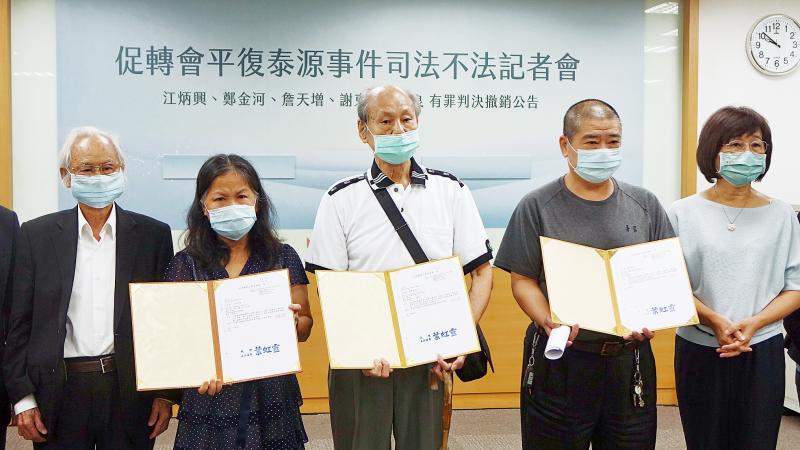The Transitional Justice Commission yesterday posthumously exonerated five prison inmates who were executed after the 1970 Taiyuan Prison Insurrection.
The five Taiwan independence advocates, held at the prison in Taitung County, seized weapons and broke out of the facility, but were later captured.
They hoped to lead an uprising against the nation’s military dictatorship and proclaim independence, said Kao Chin-lang (高金郎), who was a political prisoner in Taiyuan Prison at the time of the insurrection

Photo: Liu Hsin-de, Taipei Times
Kao has for several years organized events to commemorate the five inmates — Cheng Chin-ho (鄭金河), Chiang Ping-hsing (江炳興), Chen Liang (陳良), Chan Tien-tseng (詹天增) and Hsieh Tung-jung (謝東榮) — who were executed on May 30, 1970, after a short military trial.
A sixth prisoner, Cheng Cheng-cheng (鄭正成), who was involved in the insurrection, evaded being executed as the five claimed he had been their hostage.
The commission yesterday exonerated the five of all criminal charges.
Chiang’s younger sister, Chiang Yueh-wei (江月瑋), broke down in tears following the announcement of his exoneration at a news conference held by the commission in Taipei.
“Our whole family is honored by my uncle’s sacrifice,” Chiang Yueh-wei’s son said.
Former political prisoner Tsai Kuan-yu (蔡寬裕) thanked the commission for the exonerations, calling it the “return of justice to Taiwanese society.”
The commission said that the five saved several fellow prisoners who were involved in planning the insurrection by refusing to reveal their names.
“The ruling in this insurrection case was based on then-president Chiang Kai-shek’s (蔣介石) will — it was a breach of the separation of powers, the independence of the judiciary and the constitutional rights of these men,” the commission said.
Their actions were at the time determined to contravene Article 100 of the Criminal Code — sanctioning sedition — which resulted in the revocation of their rights and freedoms, including their right to resist and to express their political views, it said.

CHAOS: Iranians took to the streets playing celebratory music after reports of Khamenei’s death on Saturday, while mourners also gathered in Tehran yesterday Iranian Supreme Leader Ayatollah Ali Khamenei was killed in a major attack on Iran launched by Israel and the US, throwing the future of the Islamic republic into doubt and raising the risk of regional instability. Iranian state television and the state-run IRNA news agency announced the 86-year-old’s death early yesterday. US President Donald Trump said it gave Iranians their “greatest chance” to “take back” their country. The announcements came after a joint US and Israeli aerial bombardment that targeted Iranian military and governmental sites. Trump said the “heavy and pinpoint bombing” would continue through the week or as long

TRUST: The KMT said it respected the US’ timing and considerations, and hoped it would continue to honor its commitments to helping Taiwan bolster its defenses and deterrence US President Donald Trump is delaying a multibillion-dollar arms sale to Taiwan to ensure his visit to Beijing is successful, a New York Times report said. The weapons sales package has stalled in the US Department of State, the report said, citing US officials it did not identify. The White House has told agencies not to push forward ahead of Trump’s meeting with Chinese President Xi Jinping (習近平), it said. The two last month held a phone call to discuss trade and geopolitical flashpoints ahead of the summit. Xi raised the Taiwan issue and urged the US to handle arms sales to

BIG SPENDERS: Foreign investors bought the most Taiwan equities since 2005, signaling confidence that an AI boom would continue to benefit chipmakers Taiwan Semiconductor Manufacturing Co’s (TSMC, 台積電) market capitalization swelled to US$2 trillion for the first time following a 4.25 percent rally in its American depositary receipts (ADR) overnight, putting the world’s biggest contract chipmaker sixth on the list of the world’s biggest companies by market capitalization, just behind Amazon.com Inc. The site CompaniesMarketcap.com ranked TSMC ahead of Saudi Aramco and Meta Platforms Inc. The Taiwanese company’s ADRs on Tuesday surged to US$385.75 on the New York Stock Exchange, as strong demand for artificial intelligence (AI) applications led to chip supply constraints and boost revenue growth to record-breaking levels. Each TSMC ADR represents

Pro-democracy media tycoon Jimmy Lai’s (黎智英) fraud conviction and prison sentence were yesterday overturned by a Hong Kong court, in a surprise legal decision that comes soon after Lai was jailed for 20 years on a separate national security charge. Judges Jeremy Poon (潘兆初), Anthea Pang (彭寶琴) and Derek Pang (彭偉昌) said in the judgement that they allowed the appeal from Lai, and another defendant in the case, to proceed, as a lower court judge had “erred.” “The Court of Appeal gave them leave to appeal against their conviction, allowed their appeals, quashed the convictions and set aside the sentences,” the judges